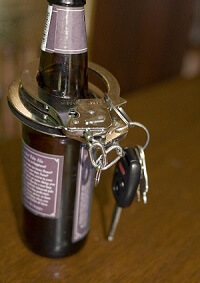
#1: Get out of the car if the officer asks you to.
When you see lights flashing behind you, pull over to a safe area that is out of the way of traffic as soon as you can. Try to remain calm and keep your hands on the steering wheel to alleviate the officer’s perceived risk of threat. If it is dark, you may want to turn on the dome light in your vehicle as well. If the officer suspects you are under the influence, she will be looking for open bottles and paraphernalia, assessing your speech and body movements for indications of intoxication, as well as watching for “furtive movements,” or suspicious actions. For instance, if she sees you lean over, she may assume you are hiding something under your seat. Stay where you are and wait for the officer to approach you. Provide the officer with your license, registration, and proof of insurance when she asks. Be aware that you do not have to answer any questions if you do not wish to. You can invoke your right to refuse to submit to questioning. Chatting about the dinner you just came from and the glass of wine you just had will not help your case. Be polite, but stay reserved and firm. Stay in your car unless the officer asks you to exit it. In that case, exit your vehicle. Never argue with law enforcement; the officer will interpret any refusal to get out of the car as an attempt to evade or a threat of danger.
#2: Do not submit to the field sobriety test.
If you have not had a drink all day and know with 100 percent certainty that all of your faculties are in good working order, you might feel safe to submit to the standardized field sobriety tests (SFST). But keep in mind that if an officer has asked you to take one, she already has a reason to believe you are intoxicated. Also, there are a lot of things that can affect the outcome of an SFST, such as certain medications and medical conditions, poor coordination, and illness. And remember – everything you do is on video. It is wiser to refuse to take the SFST, a right you retain under Florida law. If asked to take the test, you can politely tell the officer that you refuse. The state cannot suspend your license because of your refusal to take the field sobriety test. However, the officer can still arrest you if she has other cause to believe you are intoxicated, e.g., smell of alcohol, swaying, or blood shot eyes. Also, if the court tries you for a DUI, the officer can submit your refusal as evidence in your case, which may lead the judge or jury to believe you had something to hide.
#3: Refuse the breathalyzer, but know the consequences.
If the officer has reason to suspect you were driving under the influence, she can ask you at any time to take a breathalyzer or submit to chemical testing. Under Florida law, when you get your driver’s license, you automatically consent to breath or blood testing for the purpose of determining the presence of chemical or controlled substances in a suspected DUI, as per Florida Statutes 316.1932(2)(c). So what should you do? We recommend refusing the breathalyzer test. Despite implied consent, you can refuse. And the police typically cannot physically force you to take a chemical test, though they may draw blood for chemical testing if you are unconscious or if they determine someone has been seriously injured or killed. Breathalyzers are not always accurate; police officers may have incorrectly calibrated them or may improperly administer them, leading to false positives or other inaccurate results. Further, preventing law enforcement from collecting this evidence can sometimes make it harder for the prosecutor to win the case against you. But there are consequences to refusing the breathalyzer. If you deny the request to submit to a breath, blood, or urine test, your refusal will be admissible as evidence of “consciousness of guilt” if the state charges you with a DUI. You will also become ineligible for pretrial diversion programs. Most importantly, you will also lose your driving privileges for a certain length of time, depending on any prior refusals on record.
- First refusal: You will lose your license for 12 months.
- Second refusal: You will lose your license for 18 months, and the state will charge you with a separate “refusal to submit to testing” misdemeanor offense.
If it sounds like a catch-22, you are right, it is. If you submit to testing, you may incriminate yourself, but if you refuse, you will lose your license and may face additional charges. Read more about administrative and criminal DUI driver’s license suspensions in Florida.
#4: Request legal counsel.
You are not entitled to counsel before deciding whether to submit to chemical testing. So the police are under no obligation to allow you to call a lawyer before deciding whether to take the breathalyzer. That is why it is important for drivers to understand their rights before they find themselves in this situation. But you are entitled to legal counsel during police questioning. So you may refuse to answer the police’s questions until your attorney is present. Goldman Wetzel can guide you during police questioning, and can help you build your defense if the police arrest you for DUI. We will also help you navigate the DUI driver’s license suspension options available to you. You are welcomed to a call us at any time for representation or answers to questions about DUI charges. After reviewing the facts of your case, we can advise you of the best way to proceed. Contact us at 727-828-3900.
